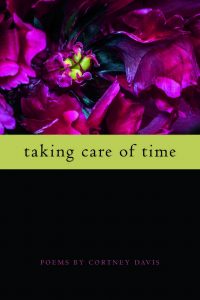 Review by Anna Limontas-Salisbury
Review by Anna Limontas-Salisbury
When nurses around the world began to make urgent pleas for Personal Protective Equipment (PPE) in the fight against Covid-19, it was as though no one knew that nursing could be dangerous. Why become a nurse? Nurse Practitioner and poet Cortney Davis answers these questions in her book of sonnets and prose, Taking Care of Time.
Nursing is a profession that calls for physical contact of care and comfort, revive and sometimes prepare for release of the body.
“Selling Kisses at the Door” is a poem steeped the magic of nursing. The narrator ending her shift enters a diner where the needy desire her attention, as if it were medicine.
as if I were Florence Nightingale or little sister to the hookers
who loitered outside the diner door. And yet,
pausing here there and there to press my lips to those sad lives,
I recognize the power of my first foray into healing. (4)
But nurses are not magicians. The healing comes with extensive training exhibited in Surgical Rotation, “The Nurses First Autopsy and Nursing 101.”
I learned how cells collide then meld and peel into spheres,
multisided like soccer balls or Rubik’s Cubes
I stabbed oranges until my hands ran with juice, then patients (3)
This detail “stabbing oranges” marks a time when white stockings and Clinic Shoes were part of the uniform; when nurses were mostly women and only residents wore scrubs.
“Teaching CPR” is a list poem of step-by-step directions for cardiopulmonary resuscitation. It’s narrated by Annie, the training mannequin developed for CPR. The poem would be a refreshing introduction to a CPR workshop.
Intubation is a word we hear a lot lately due to the current deadly respiratory infection. Intubation is the insertion of a tube into the throat to help maintain airflow into a patient’s lungs. In Intubating the Corpse, the poet paints a disturbing scene:
One takes the steel laryngoscope
And pries it in until the light
Finds the woman’s vocal cords.
There, a resident says, aim the tube. (12)
The phrases “seize her chin” and “pries” reminds the reader that medical practice is not always gentle. It is brutal.
The frustration of nurses tug of war with residents, doctors in training, is observed in lines like this one:
Finally we tire, lean with crossed arms
against the wall, the curtains drawn
To hide this scene from passerby. Nurses
watch, and speak only with their eyes. (12)
The poet has captured the line a nurse walks as both important caretaker and second class citizen, who must defer to doctors and residents.
The book takes an unexpected turn in the second section in the piece, “Becoming The Patient.” In ten stanzas of narrative prose, the reader learns what it’s like for a nurse to become a patient coming out of an operation:
I saw like waking up dream, a nurse leaning over me
her arm so close all I could see were the blond hairs
and the glistening gold of the bracelet at her wrist
and in that second I thanked God for the beauty
of the bracelet and the arm. (32)
A nurse turned patient suffers the same agonies and indignations of residents rushing in before dawn to examine with questions and poking.
five or six of them, a nightmare of men and women
asking how do you feel this morning
not waiting for a reply but rather
descending upon my body (33)
In stanza 7:
In the hospital I wanted all night
for medication to lull or exhaustion to overcome
but pain meds only made me hyperaware
of the chatter of janitors on break
the hum of the family waiting room TV (35)
This poem is a deep dive into what it’s like to be a person halted by illness, a nurse who questions the care she gave others, doubt, lack of faith and self-pity:
suffering has exposed me: intolerant
confused, selfish, unloving (36)
In the last stanza, the poet reveals that as they as about to be released from the hospital,
those who cared for them, were just laid off.
As the pandemic in America reaches heightened isolation frustration, emotional fatigue, death trauma, fear of economic collapse, and social distancing over- load, let this book remind us that as many of us are anxious to get “back to our lives” nursing continues and nurses are in need of our attention. Listen to their pain and poetry.
Taking Care of Time by Courtney Davis
Michigan State University, Wheelbarrow Press, 2018
70 pp.
ISBN 978-1611862744
Anna Limontas-Salisbury is New York based educator, writer, poet and freelance multimedia journalist. Her poetry’s been featured in Emotive Fruition. She just completed her first featured poet performance with Camperdown NYC, a new poetry reading series at Halyards, in Brooklyn. http://annalimontassalisbury.webs.com
